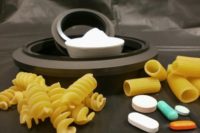Press release from the California Dairy Research Foundation.
Recently published work by researchers at the University of California, Davis examines the capability of bifidobacteria to help break down components of breast milk to help improve the overall health of infants. Breast milk provides all of the nutrients necessary to sustain and strengthen infants in the first months of life as well as protection from infections, allergies, and many other illnesses. It also contains glycans (complex sugars) that infants cannot breakdown. With the help of protective bacteria called bifidobacteria, babies are able to process glycans. It has been shown that bifidobacteria can feed off the free glycans in breast milk, but it was not clear until now if these bacteria could also acquire glycans that were linked to glycoproteins that are abundant in breast milk. This research broadens our understanding of the complex processes within the infant gut, and how protective bacteria can improve the nutrition and overall health of children.
The article "Endo-β-N-acetylglucosaminidases from infant-gut associated bifidobacteria release complex N-glycans from human milk glycoproteins" by Daniel Garrido, Charles Nwosu, Santiago Ruiz-Moyano, Danielle Aldredge, J. Bruce German, Carlito B. Lebrilla and David A. Mills, was published in Molecular & Cellular Proteomics: MCP. 2012 Jun 27. [Epub ahead of print] and has also been highlighted by The American Society for Biochemistry and Molecular Biology.
Dr. David Mills is a Professor and Peter J. Shields Endowed Chair in Dairy Food Science at UC Davis and heads up this research. He explained, "If you seek to find what milk components do in the human intestine you need to study the intestinal bacteria that are influenced by human milk in the first place. Many have known for nearly 100 years that bifidobacteria are enriched in the intestines of breast fed infants. We have been trying to explain (mechanistically) why those bacteria are there. Turns out they contain enzymes and transport systems to deconstruct the very complex glycans that are a uniquely characteristic of all milks."
EndoBI-1 is one of these enzymes and is able to remove any type of N-linked glycan. This is unique among enzymes of this kind and may give an advantage for bifidobacteria to grow in the infant intestine because the glycoproteins in breast milk have complex glycans attached.
"Thus by studying the bacteria enriched by human milk in humans, we can find enzymes that have co-evolved to deconstruct complicated milk structures. In this case we found an enzyme from bifidobacteria that cleaves all types of glycoproteins found in milk-a really unusual trait. Upon further analysis we noted it was heat stable, which makes it good for food processing. One obvious goal of this research is to find ways to translate the benefits provided by milk and bifidobacteria to at risk populations such as premature infants, malnourished children, among many others," Mills says.
Dr. Gonca Pasin, the Executive director of California Dairy Research Foundation (CDRF) stated, "This is an important breakthrough in understanding interaction of infant gut-associated bifidobacteria with host N-linked glycans found in host glycoproteins such as breast milk, and description of a novel endoglycosidase with broad specificity on diverse N-glycan types. This enzyme can be potentially a useful tool for glycoproteomics studies and dairy processing applications."
Mills went on to state, "Now this is just our first enzyme we have characterized. This same general strategy can help us identify all sorts of enzymes from infant-borne microbes that are active on all sorts of milk glycan-structures (glycoproteins, glycolipids and free glycans). Thus we are on our way to characterizing all sorts of food grade enzymes that might be useful in cheese making, milk processing and as a way to get at bioactive milk fractions from various dairy streams. We're just starting....."
This research was supported by California Dairy Research Foundation (CDRF), UC Discovery Program and the National Institutes of Health. Funding also came in the form of a dairy industry scholarship to lead-author Daniel Garrido, who was a 2011 awardee of the National Milk Producer Federation Scholarship award.
More information on how the EndoBI-1 enzyme works can be found in a recent article, Milk-fed bacteria's secret weapon, in the August 2012 issue of SPLASH! a milk science update http://milkgenomics.org/newsletter/milk-bacterias-secret-weapon.



